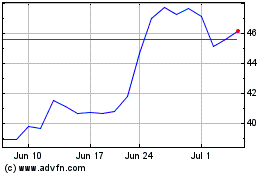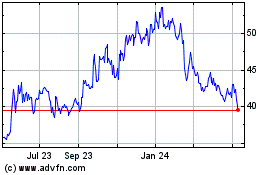Isis, Genzyme Cholesterol Drug Works, But Safety Concerns Loom
August 04 2010 - 1:26PM
Dow Jones News
Isis Pharmaceuticals Inc. (ISIS) and Genzyme Corp. (GENZ)
reported the success of two late-stage clinical trials of
mipomersen in lowering cholesterol in patients with extremely high
levels, but concerns about the drug's side effects remain.
The companies said Wednesday that mipomersen significantly cut
levels of LDL, so-called bad cholesterol, in patients with a rare
genetic disorder that were already on the maximum level of standard
therapy. The data continued mipomersen's success over four Phase
III clinical trials, but elevations of liver enzymes, a potential
signal of liver damage, has persisted and may raise questions from
regulators as well as limit sales to a small patient
population.
Shares of Isis recently fell 5.4% to $9.46, while Genzyme
dropped 1.7% to $69.
Mipomersen is Isis's most significant pipeline product. Genzyme,
reported to be in takeover talks with Sanofi-Aventis SA (SAN.FR
SNY), has highlighted mipomersen as a key product for its
future.
"Overall, we think the efficacy data from this study appears
solid, but the safety profile creates significant regulatory risk,"
JPMorgan analyst Geoffrey Meacham said.
He said that Mipomersen will likely need to be priced at more
than $200,000 a year to be "commercially meaningful," and he has "a
difficult time" projecting more than $100 million in annual sales,
if approved.
In the past, the companies have downplayed the liver effects as
normal and possibly exaggerated because it is being monitored so
closely, but Wednesday acknowledged that only a very limited
population would likely get the drug.
"We believe that these effects appear to be manageable...based
on the evidence we have today, we believe that mipomersen could be
appropriate for the highest risk patients," said Joanne Donovan,
vice president of clinical research at Genzyme.
The companies acknowledged that the drug will likely need a risk
management plan to monitor the liver issues if it is approved for
marketing.
Genzyme expects to file for Food and Drug Administration
approval in the first half of next year. Initially, it will seek to
use the drug in patients with homozygous familial
hypercholesterolemia and severe forms of heterozygous familial
hypercholesterolemia, both genetic diseases that cause extremely
high cholesterol levels.
In U.S. and top five European Union countries, there are 30,000
such patients that have exhausted the use of existing
therapies.
The latest data show mipomersen cut LDL by 36% in patients with
severe hypercholesterolemia compared with a 13% increase from
placebo. In a second study of hypercholesterolemia patients with
high cardiovascular risk, mipomersen reduced LDL by 37% compared
with a 5% reduction for placebo.
A large number of patients using the drug dropped out because of
side effects, amounting to 21% in the first trial and 25% in the
second trial.
The chief concern surrounding the future of the drug is that it
continues to show elevated liver alanine transaminases, or ALT,
which can be a signal of liver damage, as one of its most common
side effects. In one of the studies, 15% of the patients on the
drug had "persistent elevations in ALT greater than three times the
upper limit of normal." That level was higher than previous
studies.
In the call, the companies said the increased ALT levels are
associated with rapid and substantial reductions in cholesterol and
such changes could be monitored by physicians in a "real world"
setting.
Despite the elevations, the company stressed that there have
been no cases of liver toxicity and they are consistent with the
companies' expectations. Regardless, they are studying how to deal
with these cases, which may include halting use or decreasing
dosing.
Notably, the company said they haven't spoken to the FDA about
whether the data from the four studies is substantial enough to
access the safety of the drug, which would be used by patients for
extended periods. All four studies spanned 26 weeks.
Genzyme said it plans to meet with regulators before filing for
approval, but it hinted that more work may be needed.
"We will make determination after we look at these two studies
and the four studies overall as what additional work may or may not
be warranted in terms of both of pre- and post-filing," said Pam
Williamson, senior vice president of global regulatory affairs at
Genzyme.
-By Thomas Gryta, Dow Jones Newswires; 212-416-2169;
thomas.gryta@dowjones.com
Ionis Pharmaceuticals (NASDAQ:IONS)
Historical Stock Chart
From Mar 2024 to Apr 2024

Ionis Pharmaceuticals (NASDAQ:IONS)
Historical Stock Chart
From Apr 2023 to Apr 2024
